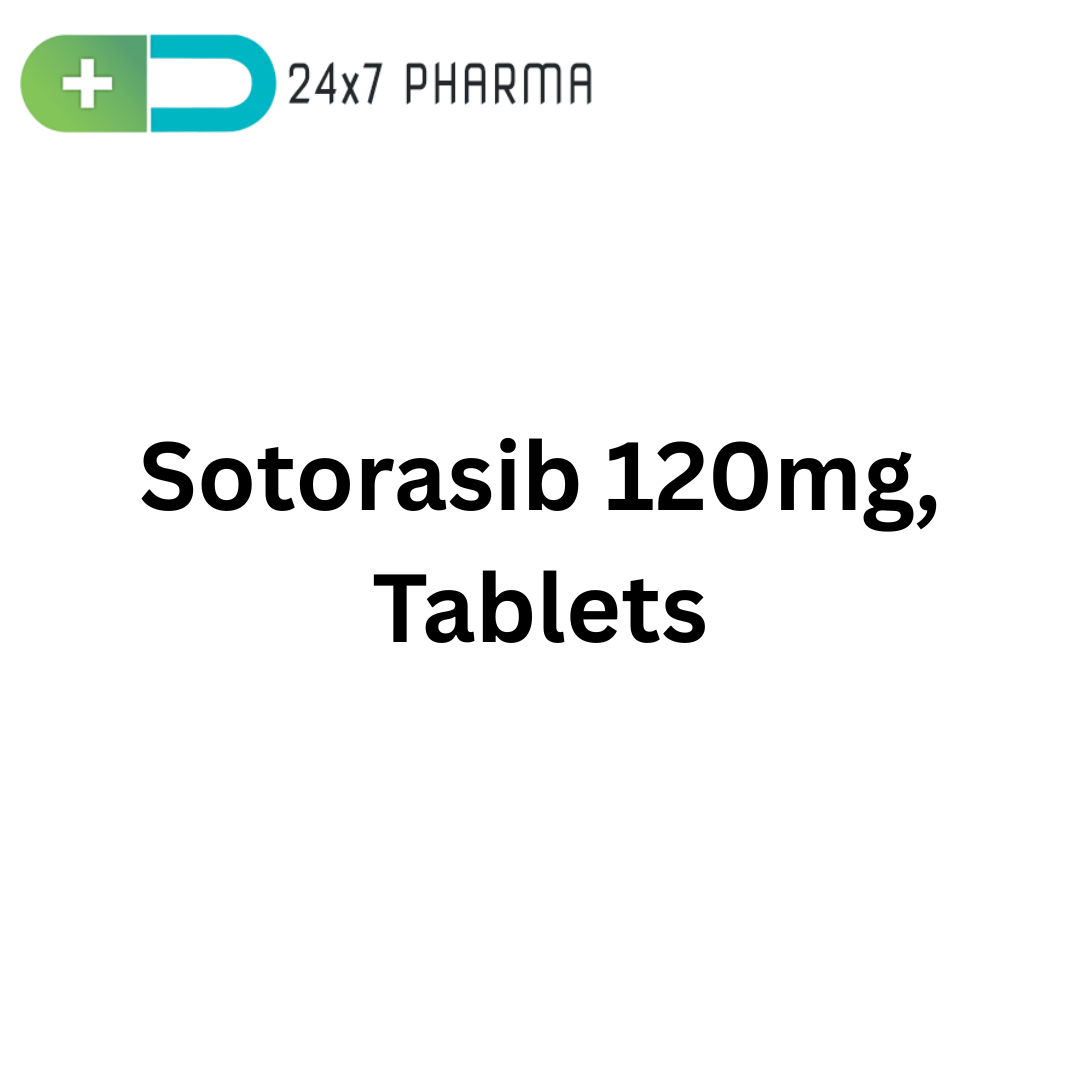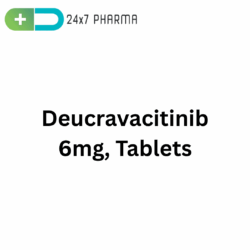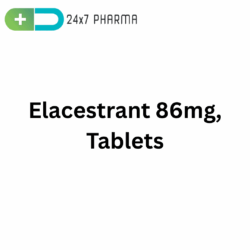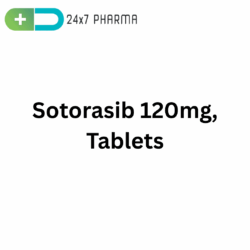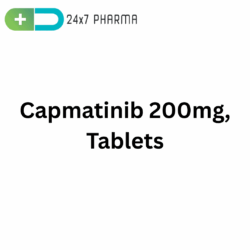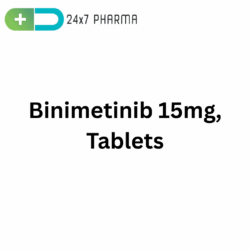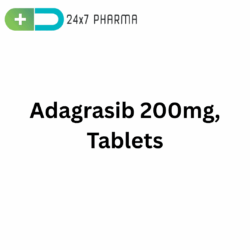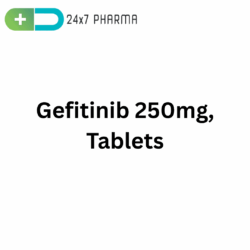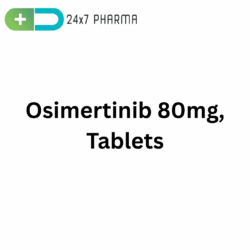Lucisot 120mg, Sotorasib Tablets
LUCISOT Sotorasib Tablets 120 mg represent a significant advancement in precision oncology, designed specifically to target a common mutation found in certain types of cancer. Manufactured under strict pharmaceutical standards, this oral therapy offers new hope to patients suffering from non-small cell lung cancer (NSCLC) with the KRAS G12C mutation. As one of the first approved targeted therapies for this mutation, Sotorasib marks a breakthrough in cancer treatment, potentially transforming outcomes for eligible patients.
What is LUCISOT Sotorasib 120 mg?
LUCISOT, which is primarily used to treat non-small cell lung cancer (NSCLC) that has spread or become locally advanced, contains sotorasib, a KRAS G12C inhibitor. Adult patients whose condition has worsened after at least one previous systemic therapy are the only ones eligible for this medicine. Sotorasib is an oral tablet that helps inhibit the growth of cancerous cells by directly targeting the KRAS G12C mutation.
How It Works / Mechanism of Action
Sotorasib is a targeted therapy that inhibits the KRAS G12C mutation, a driver of tumor growth in various cancers, particularly NSCLC.
- KRAS gene: Normally regulates cell division. Mutations in KRAS can cause uncontrolled cell proliferation.
- G12C mutation: A particular KRAS mutation in which cysteine is substituted for glycine at position 12. Tumor development and sustained KRAS protein activation result from this.
- Sotorasib’s action: It binds irreversibly to the KRAS G12C protein, locking it in an inactive GDP-bound state. This prevents downstream signaling in the MAPK pathway, thereby halting cell proliferation and promoting cancer cell death.
This targeted action means Sotorasib works only in tumors with the KRAS G12C mutation, minimizing damage to normal cells.
How to Use / Indications
LUCISOT Sotorasib is indicated for:
- Patients with KRAS G12C mutations are particularly at risk for non-small cell lung cancer (NSCLC).
- Used after progression on prior systemic treatments, including immunotherapy or chemotherapy.
- Before prescribing, healthcare providers will confirm the presence of the KRAS G12C mutation using an FDA-approved diagnostic test.
How to Take / Dosage
- Recommended dose: 960 mg once daily, which typically equals eight 120 mg tablets taken at the same time.
- Mode of administration: Orally, with or without food.
- Tablet intake: Swallow tablets whole. Do not chew, crush, or split.
- Missed dose: If a dose is missed by more than 6 hours, skip it and take the next dose as scheduled.
- Vomiting after dose: Do not take an additional dose. Resume the next dose at the regular time.
Other Dosage & Dose Modifications
Dose adjustments may be required in case of:
- Liver toxicity
- Severe diarrhea
- Elevated liver enzymes (ALT/AST)
Other serious adverse effects
Dose reduction steps include:
- First reduction: 720 mg once daily
- Second reduction: 480 mg once daily
- Third reduction: 240 mg once daily
- Discontinue permanently if toxicity persists at the lowest dose
Side Effects
Like all medications, LUCISOT may cause side effects. Common and serious adverse reactions include:
Common Side Effects:
- Diarrhea
- Nausea
- Fatigue
- Musculoskeletal pain
- Elevated liver enzymes (ALT, AST)
- Cough
- Decreased appetite
Serious Side Effects:
- Hepatotoxicity: Elevated liver enzymes and bilirubin, requiring dose adjustments or discontinuation.
- Interstitial Lung Disease (ILD) or pneumonitis: May present as new or worsening respiratory symptoms.
- QT prolongation: Though rare, it can cause irregular heart rhythms.
- Patients should undergo routine liver function monitoring and report any signs of respiratory distress or liver dysfunction.
Storage
- Store below 30°C (86°F) in the original container.
- Protect from moisture and direct light.
- Keep out of reach of children.
- Do not use expired tablets.
Benefits
- Precision therapy: Specifically targets KRAS G12C, a previously “undruggable” mutation.
- Oral administration: Convenient for patients as compared to intravenous chemotherapy.
- Improved outcomes: Shown to reduce tumor size and delay progression in clinical trials.
- Better tolerability: Compared to conventional chemotherapy, targeted chemotherapy has fewer adverse effects.
Prescription
LUCISOT is a prescription-only medicine. It should be prescribed and monitored by an oncologist with experience in targeted therapies. Before starting therapy, patients must be tested for KRAS G12C mutation.
Not recommended for:
- Patients without confirmed KRAS G12C mutation
- Pediatric use
- Pregnant or breastfeeding women without careful risk-benefit analysis
Drug Interactions
LUCISOT may interact with other medications:
Enzyme inducers/inhibitors:
- Avoid strong CYP3A4 inducers (e.g., rifampin) – may reduce efficacy.
- Use caution with acid-reducing agents (PPIs, H2 blockers) – may affect absorption.
- Monitor closely if using with warfarin, statins, or other chemotherapeutic agents.
Always inform your doctor about all medications, including OTC drugs and supplements.
FAQs
How long do I need to take LUCISOT?
As long as it is effective and tolerated; your oncologist will decide based on response and side effects.
Can LUCISOT cure cancer?
No, it is not a cure. It helps manage the disease and may shrink tumors or delay progression.
What if I miss a dose?
If more than 6 hours late, skip the dose. Do not double up.
Conclusion
LUCISOT Sotorasib Tablets 120 mg stand out as a groundbreaking therapy for patients with KRAS G12C-mutated NSCLC. Offering a targeted mechanism, improved tolerability, and the convenience of oral dosing, it has quickly become a preferred option for eligible patients. However, like all potent cancer treatments, it comes with risks that require vigilant monitoring and patient education.
Before starting treatment, ensure that mutation testing confirms KRAS G12C presence and discuss all risks and benefits with a qualified healthcare provider. With the right precautions and regular follow-ups, LUCISOT can be a vital component in managing advanced lung cancer effectively.

